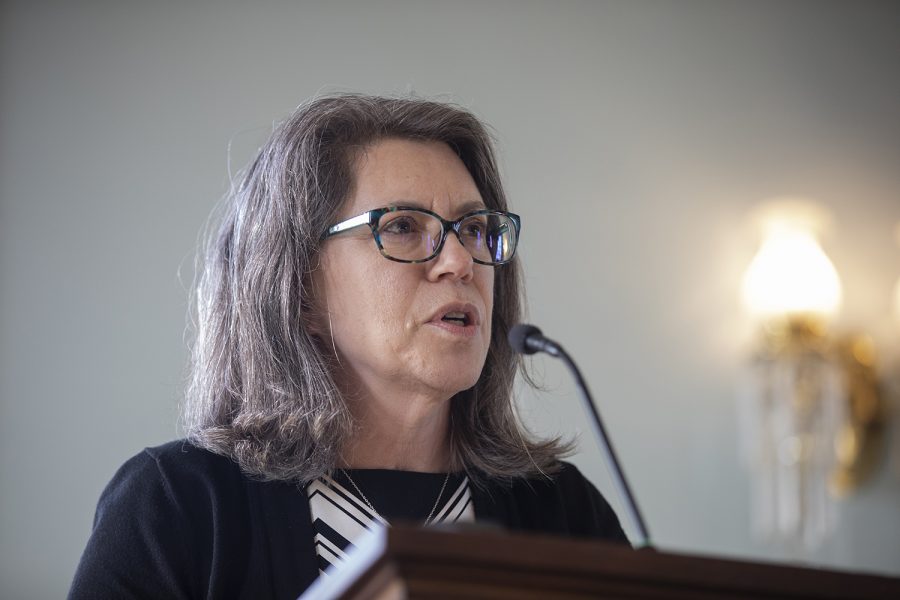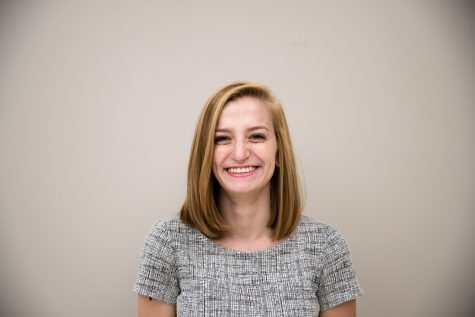University of Iowa Faculty Council voices concern on fall semester, tenure
The University of Iowa Faculty Council hosted its first virtual meeting Tuesday afternoon, where members voiced their concerns about the future amid the COVID-19 pandemic.
Faculty Senate President Sandra Daack-Hirsch speaks during the Faculty Senate meeting on April 23, 2019.
April 14, 2020
University of Iowa Faculty Council members voiced concerns about the uncertainty of the fall semester in their first virtual meeting since the UI transitioned classes online for the spring semester and shut down most of campus.
UI law Professor Caroline Sheerin said as the fall semester quickly approaches, it was important to her and her students to understand what options there will be for classes in the fall in order to make the best-informed decisions.
“[What I’m] hearing a lot from our students is about what is going to happen in the fall and that’s causing a lot of stress,” Sheerin said. “There’s so much uncertainty… Students are wondering if they should take a gap year or should [professors] take leave.”
However, state Board of Regents President Mike Richards has said the universities are planning for in-person classes and full campus operations in the fall 2020 semester. In the last regents meeting, conducted virtually, Richards said the governing board was “planning on a full, normal operation of our universities for the fall of 2020 semester. This includes in-person classes, reopening of residence halls, food service, and other campus services.”
Tippie College of Business marketing Professor Gary Russell concurred with Sheerin. He said it is a time-sensitive question that needs to be answered in order to ensure professors have time to perfect virtual learning.
RELATED: Mike Richards, Patty Cownie reappointed to Iowa regents leadership posts
“If the university is going to move and continue online in the fall, it is to the advantage of the faculty to have a lot of notice,” Russell said. “What we’re doing right now is scrambling to make [classes] good enough. If we are doing this in the fall, telling us in August is not really an option.”
Faculty Senate President Sandra Daack-Hirsch agreed, saying the fall-semester issue was on the forefront of everyone’s minds and that, hopefully, everyone will have more information to make the best decision when it comes to the 2020-21 academic year soon.
The UI has only moved the first three sessions of summer classes online through mid-June and is waiting to make a decision on sessions four and five.
“I know there are not answers to questions about [the fall semester], but I know that those concerns are being shared across campus by faculty, staff, and students alike,” she said. “I think the administration and the Dean of Students are now at a point where they can think about the fall. People are thinking about these things.”
In her president’s report, Daack-Hirsch addressed some of the biggest concerns among UI faculty following the university’s shift to virtual classes for the remainder of the semester.
Another shared concern between UI faculty members and the UI administration relates to the tenure system, Daack-Hirsh said, and extending the deadlines for tenure approval has been an important conversation at weekly meetings between both faculty shared-governance leaders and UI administrators.
“We’ve had some impact at weekly meetings [with the administration],” she said. “We have initiated the conversation [about] extending the tenure clock initiative with Provost [Montserrat] Fuentes … and I think our recommendations were well received.”
Daack-Hirsch said she spoke with members of the Ohio State University community, where similar steps to what the Faculty Council wants in respect to tenure have been taken during the unprecedented novel-coronavirus outbreak. She said the way the UI was handling the conversation made her proud.
“I’m quite pleased that our administration and the way we are addressing COVID-19 is very inclusive,” she said. “[The president] said that at Ohio State, they had really no idea that tenure was being discussed and they heard about it at the same time as the rest of campus. I feel that we have been included in the conversations about the policies and procedures that are being implemented on campus.”















